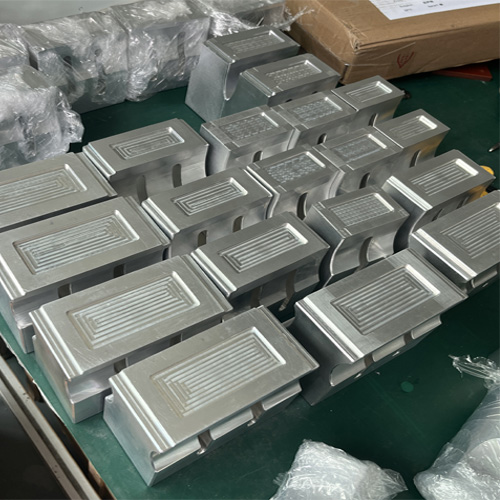
A. Ultrasonic Mold Amplitude Parameters:
Amplitude is a crucial parameter for the materials being welded. It's similar to the temperature
in fusionwelding; if the temperature isn't right, the fusion won't happen. Similarly, if the amplitude
is too low, welding might not occur, and if it's too high, it could cause material burning or structural
damage leading to reduced strength. Different companies use different ultrasonic transducers, resulting
in varying output amplitudes. Adapting ultrasonic boosters and welding horns with different gain ratios
can correct the working amplitude of ultrasonic mold heads to meet requirements. Generally, transducers
have an output amplitude of 10-20 μm, and the working amplitude is usually around 30 μm. The shape
of the booster and horn, along with factors like the front-to-back area ratio, plays a significant role in
the gain ratio.
B. Ultrasonic Mold Frequency Parameters:
Each ultrasonic welding machine has a central frequency, such as 20 kHz, 40 kHz, etc. The working
frequency of an ultrasonic welding machine is primarily determined by the mechanical resonant frequency
of the ultrasonic transducer, booster, and horn. The generator's frequency is adjusted based on the mechanical
resonant frequency to achieve consistency. The ultrasonic generator and mechanical resonance frequency
have a resonant working range, often set at ±0.5 kHz. This range ensures proper functioning of the ultrasonic
welding machine. When producing ultrasonic mold heads, adjustments are made to the resonant frequency,
aiming for aresonance frequency deviation from the design frequency of less than 0.1 kHz, typically controlled
within19.90–20.10 kHz for a 20 kHz ultrasonic mold head.
C.Ultrasonic Mold Vibration Nodes:
Ultrasonic mold horns and boosters are designed as resonant bodies with half-wavelengths of the working
frequency.In the operational state, the amplitudes at the two end faces are most sensitive to stress, while
the amplitude at the nodposition (usually a fixed location) is zero,minimizing stress. Though node positions
are typically designed to be fixed,the design of fixed positions often involves a thicknessgreater than 3 mm
or groove fixation. This means the fixed positions might not necessarily have zero amplitude,leading to a
slight loss of energy and the possibility of sound generation. Sound can be mitigated by using rubber rings
to isolate components or by using soundproofing materials for shielding.
D. Ultrasonic Mold Precision:
Due to their operation at high-frequency vibrations, ultrasonic mold horns should be symmetrically designed
to avoid imbalanced stress and lateral vibrations caused by asymmetrical sound wave transmission, which
could lead to heating and fracture. Precision requirements vary for different welding applications. For instance,
applications involving thincomponents like lithium-ion battery electrode sheets and tabs,or applications requiring
the precise coating of gold foilsdemand high precision. Using CNC equipment (such as machining centers) ensures
that the machined parts meet the required precision standards.
E. Ultrasonic Mold Lifespan:
The lifespan of an ultrasonic mold horn is determined by two key factors: material and process. Material-wise,
ultrasonic welding requires materials with characteristics like good flexibility (to minimize mechanical losses
during sound wave transmission). Aluminum alloys and titanium alloys are commonly used due to their desirable
characteristics. The choiceof material significantly affects mold lifespan and welding quality. The ultrasonic
mold manufacturing process is complex.Thus, material selection by ultrasonic mold engineers should be careful
and consider the product requirements to avoid compromising both lifespan and quality.
Phone: +86-15989541416
E-mail: michael@sztimeast.com
Whatsapp:+86-15989541416
Add: 3/F, Building 5,Huixin Intelligent Industrial Park, Xinhu, Guangmin, Shenzhen,China 518107